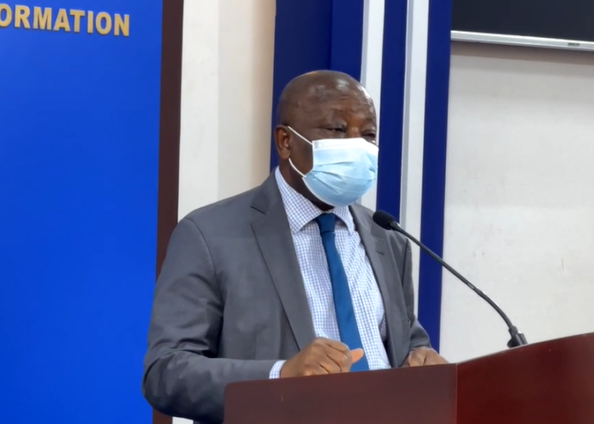Health Minister Kwaku Agyeman-Man has warned health service providers to refrain from charging patients for services already covered by the National Health Insurance Scheme (NHIS) to revive public confidence in the scheme.
According to Kwaku Agyeman-Manu, the co-payment — a separate charge imposed by service providers for conditions already covered by the scheme — had become a major challenge for the scheme, and called on service providers, particularly, the Ghana Health Service (GHS), to help address the situation.
“Co-payments have been banned. The President hates to see poor patients being charged out of pocket for healthcare services,” he said.
“Maternal services such as deliveries are supposed to be free, but some facilities are charging patients as high as GH¢1,000 for the service, and that is unacceptable.
"When it happens that way, to the end-user it will look as if the scheme is not working,” he added.
Speaking to the Daily Graphic in Accra, the sector minister said co-payments created a barrier to access, and so the Ministry was working to end the illegality through meaningful engagements.
“Fortunately, the government has, in recent times, been doing well with timely payments. We have been doing frequent monthly payments in bits to ensure service providers get monies frequently.’’
“The arrears gap has been bridged over time. Service providers are owed about four or five months as compared to the situation that persisted some years back when they were owed 12 months and beyond.
“Service providers have therefore, no justification to indulge in co-payments. The act amounts to extortion, and that is illegal,” he said.
The minister said the NHIS was still effective and continue to provide unfettered access to healthcare delivery.
He said the government would continue to invest in the scheme, and added that the scheme had not shown any signs of crumbling.
Call on GHS
Mr Agyeman-Manu urged managers of the GHS, who constitute about 70 per cent of healthcare provider agencies under the ministry, to combat the canker that could make the NHIS unattractive.
“From the end-users' point of view, it looks like the scheme is not working as a result of the extortions.
"This statement is not meant to insinuate that health insurance is not working, but is an admonition to the managers of the Ghana Health Service to help end this criminality by every means possible,” he said.
The minister said the government was investing to strengthen the scheme, especially to deliver on the universal health coverage, a policy that seeks to ensure that there were no barriers to accessing health care.
“With huge investments and efforts being made, there is no way I would, in any way, suggest that the scheme is ineffective as being speculated,” he said.
NHIA caution
In January this year, the Chief Executive Officer (CEO) of the National Health Insurance Authority (NHIA), Dr Bernard Okoe Boye, cautioned facilities against co-payment arrangements or risk losing their accreditation.
"I am announcing confidently that very soon the accreditation of health facilities which additionally charge active NHIS patients with impunity will be revoked.
“The NHIA annually injects GH¢120 million into the health sector, an average of GH¢1.5 million is paid to each health facility every month across the nation.
"So we are pumping so much into the health sector on a monthly basis, and, therefore, we demand that patients who visit the hospitals should be taken care of and not be made to pay for services covered by the NHIS," he said.
Admitting that there were often delays in the payment of claims, Dr Okoe Boye, however, attributed the delay in the payment of claims partly to the fact that "some of the tariffs are high and unrealistic."
In February this year, the MoH and the National Health Insurance Authority (NHIA) reviewed upward the prices of medicines and services paid to the service providers and suppliers on the health insurance scheme to prevent them from making losses or refusing to offer services.
He said that the reviews were in accordance with the National Health Insurance Act, 2012 (Act 852), explaining that they were necessary to enhance service delivery for subscribers and give providers value for money to avoid certain gaps in accessing medications and services under the scheme.
Latest Stories
-
GIFEC strengthens ties with AT Ghana to enhance rural connectivity and digital inclusion
2 minutes -
Goldbod will be sole exporter of gold in Small-Scale mining sector – Sammy Gyamfi
16 minutes -
Using the CHILD and MOTHER model to curb conflict in Bawku
36 minutes -
I’m respectful and never insulted anyone’s father – Mike Oquaye Jnr
45 minutes -
Desist from betting – E.P College of Education Principal to students
53 minutes -
NRSA to train Okada riders, enforce uniforms and helmets before legalization
1 hour -
“Africa Salutes You” – Rugby Africa Congratulates Newly Elected IOC President, Kirsty Coventry
1 hour -
Heavyweight boxing legend George Foreman dies aged 76, says family
5 hours -
World Cup 2026Q: Lawrence Agyekum makes Black Stars debut in Chad win
6 hours -
No one should be treated as guilty until proven – Deputy A-G on arrest of Kwabena Adu Boahene
9 hours -
‘We will do everything to stay top of Group I’ – Otto Addo
9 hours -
‘I had a good appetite for dinner’ – Mahama on Black Stars’ 5-0 win
9 hours -
High cost of pain: Why physiotherapy remains a luxury for many Ghanaians
9 hours -
2026 FIFA WCQ: Black Stars thrash Chad 5-0 to go top of Group I
10 hours -
Deloitte, Tony Elumelu Foundation strengthen commitment to empower 250,000 African entrepreneurs by 2030
10 hours

